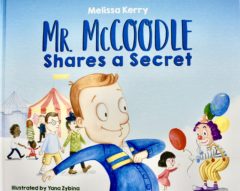Mr. McCoodle Shares a Secret

Written by: Melissa Kerry
Illustrated by: Yana Zybina
Published by: Bookwrangler 2021
This seemingly simple picture book teaches an important message – everyone’s feelings are legitimate. And these feelings should be acknowledged, validated, and addressed. We all have them!
This book takes its young audience into consideration with its engaging story, text, characters, and illustrations. The setting is a typical fair with rides, weight guessing and strength competitions, and clowns. The animal characters are charming and endearing with cute alliterating names: Jayna the Giraffe, Collins the Cow, and Flora the Fish. Even “Fabulous Frank” is a fun, playful version of Frankenstein.
Mr. McCoodle observes different characters enjoying the various activities at the fair. But he feels afraid, not happy and excited like the others at the fair. Mr. McCoodle sees Janya the Giraffe on the spinning swings and thinks, “…swings are far too high. He watches Fabulous Frank swing a huge hammer to cause a bell to ring and thinks that “…the hammer is very, very heavy.”
A third example in the book that makes Mr. McCoodle anxious is somewhat problematic. In this scenario, a clown guesses Collins the Cow’s weight, and Mr. McCoodle worries about how Collins the Cow feels when “…all eyes are on him when he is far from slim.” Given the present issues associated with body shaming, this example may not seem prudent. However, it is a teaching moment. Since Collins the Cow appears to be far from ashamed of his appearance, this is an excellent opportunity to discuss body image and that what truly counts are inner traits.
When Mr. McCoodle admits he is scared, he wonders, “What should I do? Hah-ree hah-roo, I want to have fun too.” Not to worry, Flora the Fish comes to the rescue. She sympathizes and empathizes with Mr. McCoodle, explaining that she gets scared too. Flora explains that Collin the Cow helped her overcome her fears. She offers to pay it forward and help Mr. McDoodle overcome his fear of riding the Raging Roller by riding with him. She reassures him by telling him, “Everyone is busy having fun, every single one!” However, Flora the Fish’s statement, “No one judges, no one cares,” is, unfortunately, more aspirational than factual. Nonetheless, being nonjudgmental is a goal we should encourage children to attain and is well worth discussing with them.
The illustrations are bright, cheerful, and colorful, like a cartoon. The animals have fun, exaggerated features. The humans depicted are diverse in many ways. For example, the ticket seller wears a t-shirt with “Equality” on it and has a purple feather in her hair to express solidarity. An array of ethnic groups is depicted. In addition, people with disabilities are included. It is vital that every child can see themselves in a book and understand that different outward appearances do not change the fact that we are all human beings.
So many messages packed into twenty-six pages! Everyone has feelings. Children should feel comfortable talking about their feelings. We need to let others know we have similar feelings and understand that everyone’s feelings are valid and important. Have empathy and sympathy. Help others cope with their emotions. Pay forward the support and care that has been shown to us. Be a friend by helping others to overcome their fears. And it is what is on the inside that truly counts!
All in all, this is a good springboard for discussing feelings, empathy, sympathy, and the spirit of paying good deeds forward with children. It is recommended for ages three to six years.
